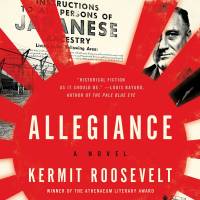Caswell "Cash" Harrison, the protagonist in this legal thriller set during World War II, is a fortunate young man. Fresh out of Columbia Law School, his family ties to the network of Philadelphia patricians promises him a cozy legal career. But having failed his military physical on a technicality, Harrison winds up in Washington, D.C., as a clerk to Associate Justice of the Supreme Court Hugo Black, toiling at the mundane task of screening petitions of certiorari to determine the cases that are relevant for the court to hear.
Allegiance, by Kermit Roosevelt
400 pages
Regan Arts., Fiction.
Soon, however, Harrison finds himself caught in a web of intrigue, and what at first seems to be a typical Washington tug-of-war between conservatives and liberals transforms into something more sinister, including murder.
"Allegiance" shifts between the halls of power in wartime Washington to the gritty, isolated conditions of the Tule Lake internment camp in California. Through meticulous historical research, the author — a great-grandson of U.S. President Theodore Roosevelt — touches on the plight of Japanese-Americans, and particularly the so-called "no-no boys," U.S. citizens threatened with deportation due to their refusal to give loyalty oaths.
While Harrison is fictitious, the book is peopled with real-life historical figures, including Justices Black and Felix Frankfurter, FBI Director J. Edgar Hoover and unsung heroes like Masaaki Kuwabara, who refused military conscription until his rights as an American citizen were restored.
Although not as tightly spun as a John Grisham thriller, "Allegiance" is of particular interest for its depictions of Japanese-Americans' struggles during the war years.


















With your current subscription plan you can comment on stories. However, before writing your first comment, please create a display name in the Profile section of your subscriber account page.